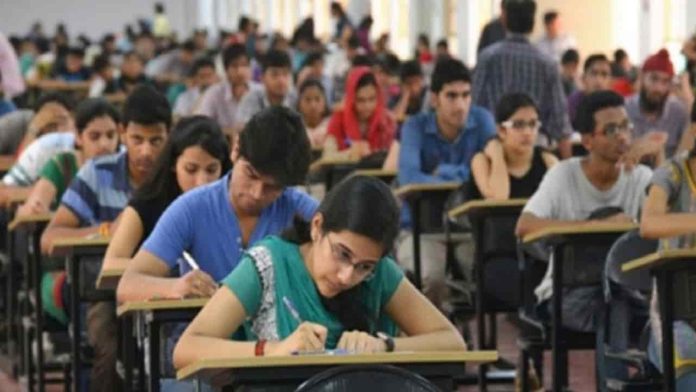Introducing strict provisions to curb cheating in competitive exams, the Jharkhand assembly passed the Jharkhand Competitive Examination (Measure for Control and Prevention of Unfair Means in Recruitment) Bill, 2023 on August 3, 2023. With the aim of preventing plagiarism in competitive examinations, Parliamentary Affairs Minister Alamgir Alam tabled the Bill.
According to the Bill, if any examinee is caught cheating or causing it, he will be imprisoned for a year, as well as a fine of up to Rs 5 lakh can be imposed on him. If he fails to pay the fine, he will get an additional nine months’ imprisonment. Moreover, if the candidate is caught stealing or cheating a second time, he will be sentenced to three years and a fine of Rs 10 lakh will be imposed.
After the chargesheet is filed against the candidate in court, he will not be allowed to appear in the examination for 2 to 5 years. If convicted, the candidate will not be able to appear in the competitive examination for 10 years.
The Bill also punishes institutions and provides that if a printing press or the management system which conducts an examination or the person engaged in transport or a coaching institute is a plotter, then the punishment can be from 10 years to life imprisonment. There is also a provision to impose a fine ranging from Rs 2 crore to Rs 10 crore and if there is failure to pay it, an additional three years of imprisonment will be imposed.
In case a candidate and agencies are caught adopting unfair means during competitive examinations, there is a provision of sending both to jail without any preliminary investigation and registration of an FIR. This Bill will be applicable for examinations conducted by the Jharkhand Public Service Commission, Staff Selection Commission and Recruitment Committees and public undertakings.
Agencies involved in the task of examination, government employees disclosing question papers or making public information that violates the secretiveness of the examination have been included in the category of punishable offenses. Threatening employees involved in examination duty, their family members or relatives and propagating incorrect information regarding the examination are also offences.
Some important facts of the Bill are:
- Preliminary inquiry is not required for FIR.
- The investigation officer will not require permission from anyone before arresting the accused person.
- Investigation of this crime case will not be done by an officer below the rank of DSP. Where DSPs are not deployed, SP level officers will conduct research.
- The state government will set up a special court in consultation with the chief justice of the Jharkhand High Court to hear the matter.
The Opposition led by the BJP demanded the Bill be sent to a select committee and termed the law draconian. Rejecting this, Alam said that a tough law is required to stop unfair means such as paper leaks and cheating in examinations so that there is fear among those who adopt such practices.
Opposition MLAs walked out of the House, tearing a copy of the Bill. It was alleged that it would lead to harassment for job aspirants and misuse of the law would give an opportunity to corrupt officials. Questioned was raised as to how an examinee can be punished so much if caught cheating and how he could be arrested without a warrant.
Incidentally, several states have enacted such laws in the last few years. Paper leaks have occurred in Uttarakhand in 2016 and 2021 in the panchayat development officer exams and the Uttarakhand Subordinate Services Selection Commission exams, respectively. The papers of The Uttarakhand Public Service Commission were also leaked in January 2023. Following protests, the Uttarakhand Assembly passed an anti-cheating Bill in March 2023.
In Gujarat, paper leaks are rampant and since 2015, not a single recruitment exam has taken place without this menace occurring. In February 2023, the assembly passed a law to punish cheating in public examinations.
Other states which have passed such laws are Rajasthan (passed in 2022), Uttar Pradesh (passed in 1998) and Andhra Pradesh (passed in 1997).
—By Shivam Sharma and India Legal Bureau


